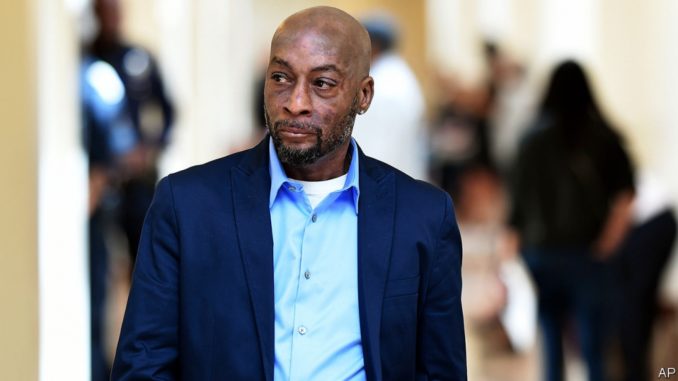
IT WAS a battle between David and Goliath. On one side was Dewayne Johnson (pictured, above), a former school caretaker who is terminally ill with non-Hodgkin lymphoma, a blood-cell cancer. On the other was Monsanto, a chemicals giant recently purchased for $63bn by Bayer, a German rival. In the first case of its type, Mr Johnson’s lawyers argued that Roundup, a weedkiller made by Monsanto, had caused his cancer. To the industry’s shock, on August 10th the court decided in Mr Johnson’s favour, ordering Bayer to pay him $289m in damages.
Bayer’s shares abruptly fell by 11% to their lowest level in five years, wiping $11bn off the firm’s value as investors totted up the potential bill from other litigants. Other weedkiller-makers were hit harder still. Shares in Nufarm, an Australian chemicals firm that makes products similar to Roundup, slid by 17%.
The case centred on whether glyphosate, an ingredient in Roundup, causes cancer. Bayer denies that, and has the backing of many. Although the World Health Organisation declared in 2015 that glyphosate was “probably carcinogenic”, America’s Environmental Protection Agency and the European Union consider it safe to use. Most reputable scientific studies find that glyphosate poses no risk to humans. Yet there is a correlation between farming work and incidence of non-Hodgkin lymphoma. More research is needed to find whether there is a causal link to glyphosate exposure, or whether it becomes toxic when mixed with other chemicals, says Robin Mesnage, a toxicologist at King’s College London.
The award to Mr Johnson is so substantial because his lawyers persuaded the jury that Monsanto had known of links between glyphosate and cancer since 1983 and had covered this up. Bayer also denies this. It hopes the ruling will be overturned by an appeal court, where decisions are made by judges rather than a jury influenced by what a company spokesman reportedly called “junk science” and “emotional arguments”.
But investors are anxious because even if Mr Johnson’s damages are reduced or overturned, another 5,000 cases targeting Monsanto are going through America’s legal system. The total cost could hit $5bn, said Alistair Campbell of Berenberg Bank, similar in scale to the $4.2bn Bayer paid out in the 2000s when its Baycol cholesterol drug was linked to patient deaths. And a regulatory crackdown on glyphosate would not only hit sales of pesticides and weedkillers, but also the seeds that firms have developed to be used with them.
Bad as this all sounds for Bayer, there is a silver lining. The case, and others like it, could hand big chemicals companies an advantage, says Jason McLinn of Bain & Company, a consultancy. Extra testing of chemicals to avoid legal cases, even when regulators have approved a substance, will push up the cost of developing new ones; that cost will be harder for smaller firms to bear. Worries about indiscriminate pesticide use could also encourage greater take-up of precision techniques, which big firms have invested in.
European farmers, meanwhile, fret that the judgment will embolden France, which wants to ban glyphosates in the EU. On August 11th its environment minister declared the “beginning of a war” against the chemical. Farmers do not have a wide choice of pesticides that are both cheap and effective. They and their workers are most exposed to glyphosate’s possible dangers; but they will also face a financial hit should it be outlawed.
END

Be the first to comment